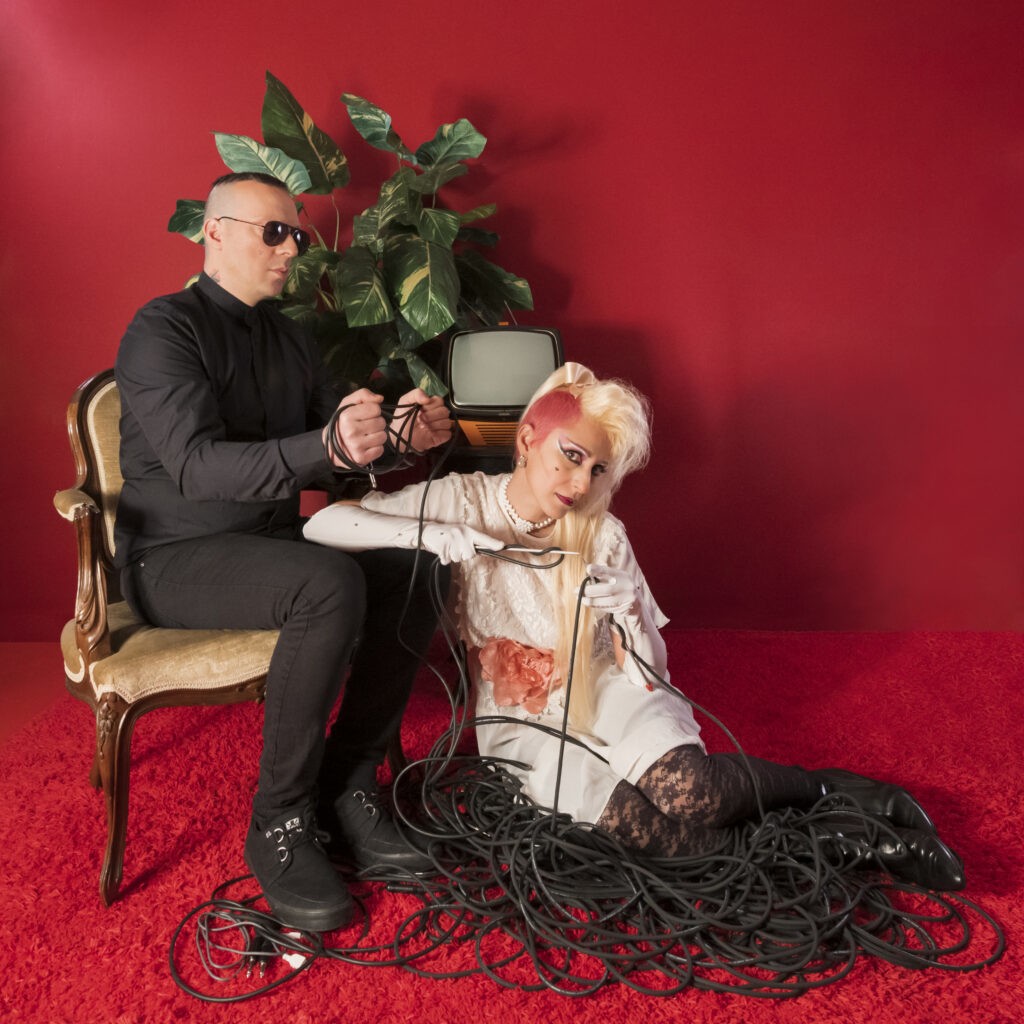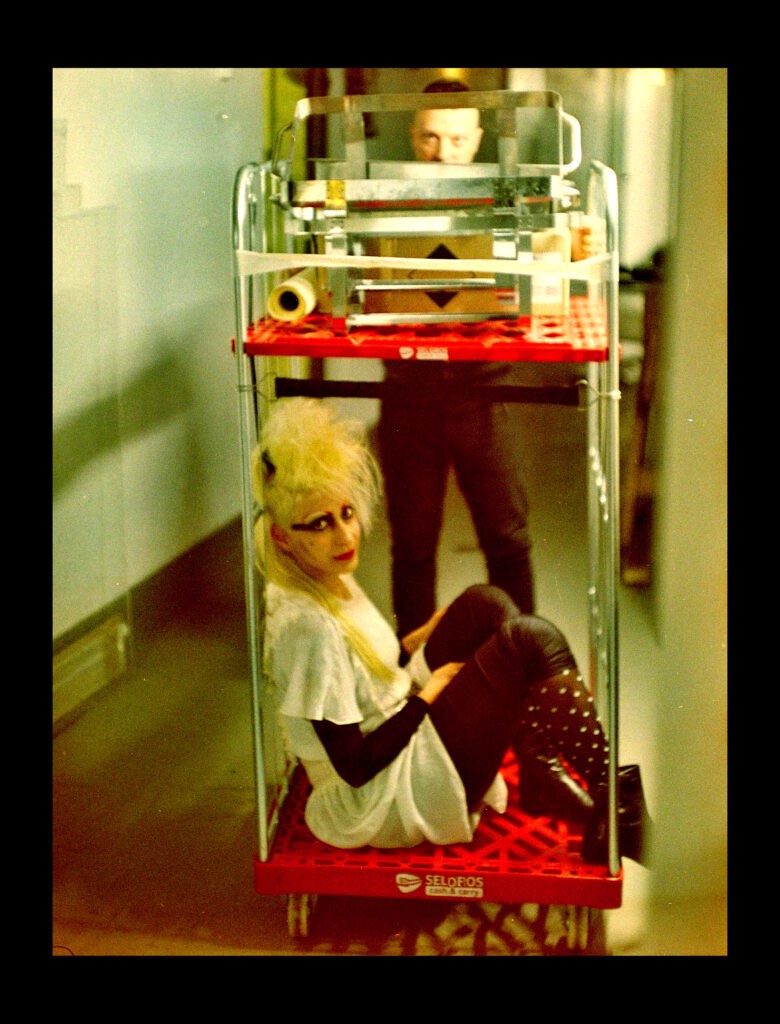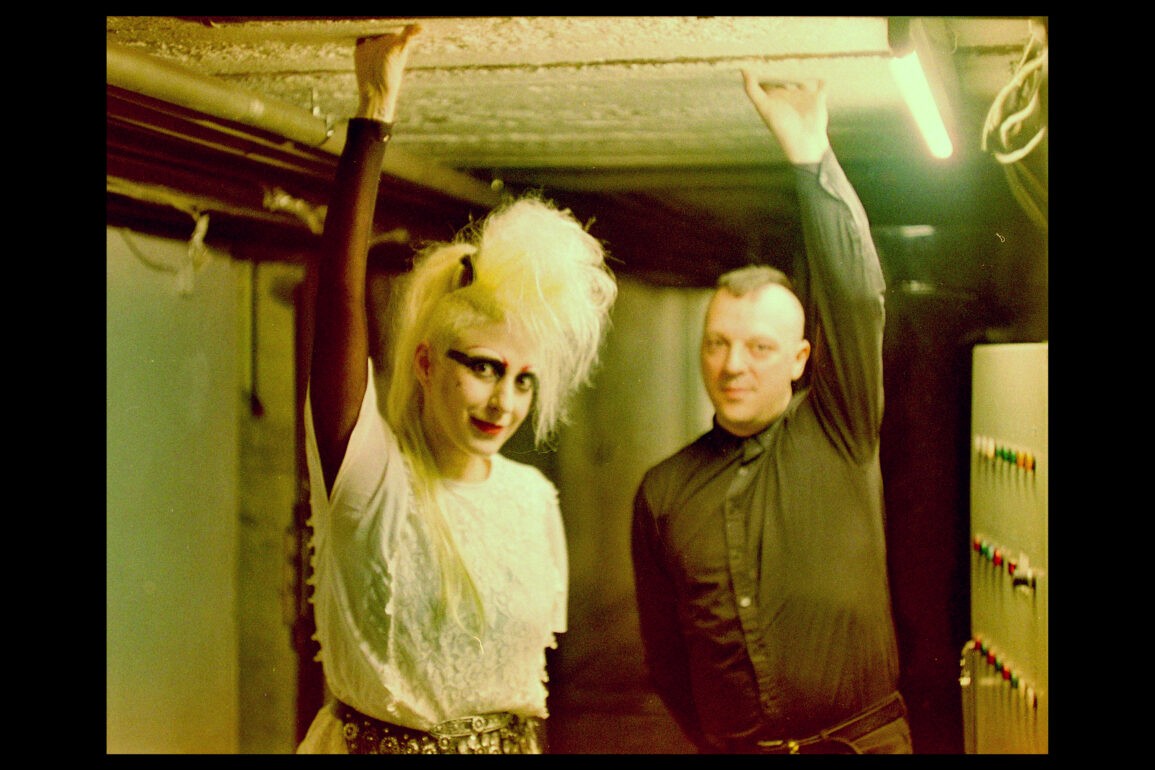Greek darkwave duo Selofan has recently released their latest record, Partners in Hell. Loving what we’ve heard, we reached out to Joanna and Dimitris and engaged in a lovely chat. The topics discussed include the goth scene, Fabrika Records, Athens, memories and many more. Hope you enjoy reading it.
You can check out the Turkish translation of the interview here.

Thanks for this interview. I want to start off by reminiscing about how I first listened to your music: It was last year’s Fabrika Night in Istanbul, where She Past Away and Tango Mangalore also played. I loved your setlist, and specifically fell in love with one song. I looked it up desperately on the internet to zero results. That was until when I listened to Partners in Hell and “Auf Deiner Haut” came up. It was a moment of joy, hearing that song after such a long time. Do you have any memories about that night?
That was the third time we played in Istanbul and probably the best one. Not that we didn’t love every single time in your wonderful city, but that last Fabrika Night was the biggest event we played in Istanbul so far. Therefore it really touched my heart to watch the progress achieved by the Fabrika family during the last decade. The first time we played with SPA in Istanbul, it was in a small club for about one hundred people and the night you mention was a sold-out show in a superb concert venue of a thousand capacity. I was also impressed by the fact that the audience knew the lyrics and was singing to our songs. During the SPA show I spoiled my make up and cried a bit, because we know the guys since the beginning and they really managed to light a fire and create a scene over there.
Isn’t it crazy that so much about the world has changed since that day? How are you doing in the current pandemic?
It is pure paranoia. The world changed too fast to process. I gave up trying to understand what’s going on, since they are hiding it from us anyway and live day-by-day. We are now in a general lockdown for three weeks and it’s unknown for how much longer, I avoid watching the news, it’s masochistic, if I want to see a sci-fi movie about the end of all things I prefer to choose it myself. What keeps us going is our synthesizer shop, (synthesizer.gr) we are now closed but we still work online and keep ourselves busy, as well as Fabrika, our record label. We need to keep our mind and body active, all of us right now.
What can you say about the creation process of Partners in Hell?
We went literally through hell and back. It was the most “uneasy” album in the making so far, as we wanted it to be the best. If you don’t have the feeling that your current album is your best work so far, then there’s no reason to go on making music. We are now more demanding of ourselves. And of each other. There has been tension in the studio, which is unusual as we both are quiet people. But every voyage takes you a bit farther despite the difficulties that come your way. We definitely feel that through this album, we discovered new territories in our musical research.
What does the title of the album indicate? Is the idea of you being in hell related to today’s climate or does it go far back, as the world’s always been a hell of sorts? What emotions or states of mind are dominant in this record?
Selofan is “based on a true story”, meaning all lyrics are intimate, it is our story and our personal gains and losses in this world. The title is actually a lyric of a song that didn’t make it on the record. Funny isn’t it? Dominant in this record is the passing of a friend, someone who contributed big time to who I am today and who left this life way too soon.
The mix of “There Must Be Somebody” is by Serafim Tsotsonis, a friend of Kıyı Müzik and a remarkable musician himself. How did your collaboration come to be?
The mix of the whole album is by Mr. Tsotsonis, it is the first time we ever worked with a producer and we are super happy about it. Serafim came to our synth shop, that’s how we met, of course we knew him as a musician already. I was in the club and danced to the tunes of the live presentation of his album Peak back in 2006, gosh that’s already almost 15 years ago. This younger me doesn’t exist no longer as well as the club he played that night, but we found ourselves sitting together in his studio mixing our album in 2020. And that’s the magic of music!
Listening to the lyrics of the album, the love you share sounds as firm and strong as ever. Would it be right to assume that love has been a primary catalyst for you as artists?
Well, Selofan is a product of our love, we could never have done it with other people. It is like our child, only made of vinyl. 🙂
Joanna, can you name some of your major influences as a vocalist?
I won’t surprise you here, i love strong, deep, female vocals like Nico from the Velvet Underground, Anja Huwe from x-mal-Deutschland, Bettina Köstner from Malaria, Nina Hagen, Poly Styrene from x-ray-spex, Ari Up from the Slits, Siouxsie Sioux, Annie Lennox, Grace Jones. Quite amusing is the fact that some people think Dimitris would sing on some tracks when it’s actually me and that for me is a compliment.
Dimitris, being a multi-instrumentalist, are there any instruments you’d wish to incorporate more into Selofan’s music?
The synths will always be the protagonists in our music. We are just two people and I make the whole music by myself. And this is why synths are so great, you can fill up any idea and then experiment on the sound and the possibilities are endless. I do also use physical instruments like bass and saxophone but I only have two hands 🙂
Saxophone is not really an orthodox instrument in your genre, yet it fits perfectly to your music. How did this idea first come up?
It was Dimitris’ vision and I really admire him for playing such a difficult instrument by instinct. It is really a special Selofan characteristic and it fits perfectly well to both our more danceable and the sentimental tracks.
You love experimenting with musical ideas. What are the current bands or projects that inspire you along this path?
The truth is we are mostly inspired by old bands, being not the youngest ourselves.
I’ve recently asked Lebanon Hanover what does the word “goth” actually mean to them, and I would like to hear your opinion as well on the subject.
Goth was a music/art/fashion movement born in the 80s/late 70s. It doesn’t exist as such today. There is a revival currently, as goth expresses the teenage angst which is universal and everlasting, and the “No-Future” perspective of the early punks and goths is nowadays more meaningful than ever. But the originality and the raw power of a new movement is missing. Reproduction can still be of great quality and honest emotions, but it’s rare that it also matches a certain lifestyle. The first goths had the whole package.
Aside from music, what other fields of art influence you as artists?
During this extended quarantine and isolation, life consists of books, music and movies. It always had, but now more than ever. After all art is the lie that enables us to realise the truth, as Picasso said.

You, She Past Away and Lebanon Hanover all are musical duos. Why do you think so many bands from the darkwave scene today are duos or solo projects rather than bands?
If you find your other half, why keep searching? More people in a band mean more phone-calls to make, arrangements for rehearsals, probably more rehearsals that need to be done if more instruments are involved, more time to go to studios, more socialisation, in general everything is more. It is simpler to be a duo, a closed circuit of two people has a strong dynamic, and finally our kind of music doesn’t necessarily require a band. Synths can do the work.
Athens is your home, and seemingly a great catalyst for many similar acts today. What can you say about Athens and its music culture?
Athens is small, but offers -or used to offer until the pandemic killed the nightlife- a vibrant music scene dedicated to the underground music of all genres. And there is a variety of clubs, concert venues, bars that are dedicated to this scene. There have been many great Greek bands doing what we do now back in the 80s, only they didn’t have the opportunities offered to us by the world wide web and they remained unknown and forgotten. Athens is inspiring, it doesn’t really feel like just another European city in a globalised world, it has its own flair, style and sense of freedom. And its own underground music scene. Plus life is still affordable, this is why many artists from abroad moved to the city during the last decade.
Do you also refer to Athens with the lines “Diese Stadt ist schon längst tot / Doch wir wollen nicht mehr fort” in the wonderful track “Nichts”?
Yes, it is a love-hate relationship we have with our hometown, but perhaps you sometimes feel the same about yours? I guess everybody feels like that from time to time towards everything familiar.
Beyond Greece, you have fans all around the globe. Can you name a very precious memory from another place you’ve been to?
We treasure everyone who ever invited us in their country and each country we have visited has its own special place in our hearts. Extraordinary was our first visit to Mexico not only because it was our first transatlantic flight, but also it was at a very special occasion. Back in 2012 right after we released our first record, we were invited by a girl to play in Mexico city at her private birthday party. It sounded unreal to us being beginners and still unexperienced in the music business, that someone liked our music so much, they payed such an expensive flight to see us. And the best coincidence was that it also was my birthday on exactly the same day!
Any current artists you don’t personally know but adore and would like to meet?
Difficult. All my beloved ones are dead. Now how goth is that? 🙂
You’re in the music industry both as a band and as a company, so I feel compelled to ask: From an administrative perspective, how has the sudden shift in our lives affected the industry? How hopeful or desperate does the situation seem to be?
The situation isn’t very hopeful, but hope dies last. As a label we keep on doing what we did, as long as the artists produce music, we release it. Less touring equals of course to a financial death, but if you choose to be optimistic it also provides more free time to write new music. Hopefully when this horror is over, many wonderful records will brighten our lives, so support your favourite bands and labels, buy a record for yourself or the ones you love, for where is music there is life.
Hopefully all will be back to normal soon and we’ll have more Fabrika Nights. What are your plans toward the future?
We aren’t exactly into planing things as the current situation doesn’t allow it, we are wishing and hoping there will be more Fabrika nights and more çay with locum to enjoy with you someday soon.
Any words you’d like to add?
Thank you for the interview, you are one of our favourite audiences around the globe!
You can check out Selofan’s Bandcamp profile here.



